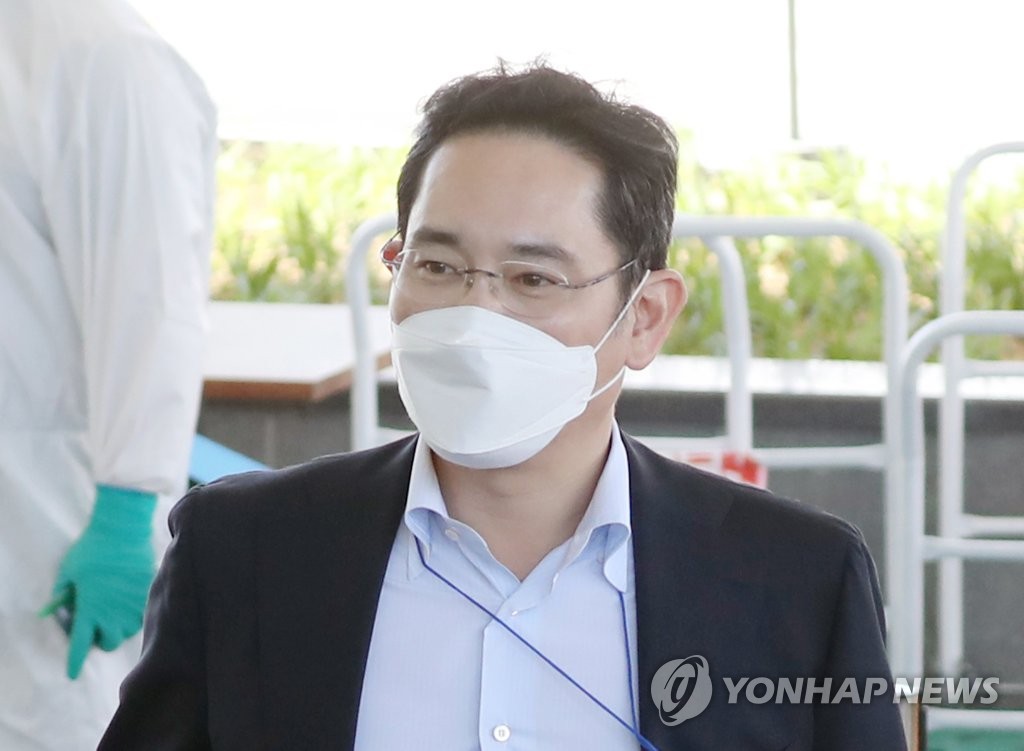- California Assembly OKs highest minimum wage in nation
- S. Korea unveils first graphic cigarette warnings
- US joins with South Korea, Japan in bid to deter North Korea
- LPGA golfer Chun In-gee finally back in action
- S. Korea won’t be top seed in final World Cup qualification round
- US men’s soccer misses 2nd straight Olympics
- US back on track in qualifying with 4-0 win over Guatemala
- High-intensity workout injuries spawn cottage industry
- CDC expands range of Zika mosquitoes into parts of Northeast
- Who knew? ‘The Walking Dead’ is helping families connect
Samsung heir questioned over 2015 merger of key affiliates
Samsung heir Lee Jae-yong was summoned to the prosecution Tuesday to be questioned about suspicions surrounding the top conglomerate’s controversial merger of two leading affiliates in 2015.
Lee, vice chairman of Samsung Electronics, appeared before prosecutors at the Seoul Central District Prosecutors Office at around 8 a.m. to face questioning about the Samsung management’s decision-making process in the merger of Samsung C&T Corp. and Cheil Industries Inc. five years ago.

This file photo shows Lee Jae-yong, vice chairman of Samsung Electronics. (Yonhap)
It is Lee’s first attendance at the prosecution since February 2017, when he was grilled and arrested for allegedly offering bribes to a confidante of former President Park Geun-hye.
Lee’s arrival was not open to the media, and prosecutors will not make public when the questioning will end, in accordance with a recently revised rule on handling criminal cases. Lee was reportedly called in his capacity as the accused.
Prosecutors suspect Samsung’s top management was involved in the conglomerate’s efforts to facilitate Lee’s managerial succession from his ailing father, Lee Kun-hee, and may have intentionally lowered the value of Samsung C&T prior to its merger with Cheil Industries to help benefit the heir apparent.
Lee was the largest shareholder in Cheil Industries, an affiliate that produces textiles, chemicals and electronic chemical materials, with a stake of 23.2 percent, which means a fall in the valuation of Samsung C&T paves the way for a merger ratio advantageous to the Samsung heir.
Prosecutors are looking into suspected inflation in the value of Cheil Industries ahead of its merger with Samsung C&T. In one instance, the official land value of Everland, the nation’s largest theme park owned by Cheil, surged 370 percent in 2015.
At that time, Samsung C&T was suspected of downsizing the volume of its overseas construction orders and domestic housing construction contracts. Samsung C&T also reported an 11 percent decrease in sales in the first half of 2015 and suffered steady falls in its stock prices, which led to a merger ratio of 1:0.35 favorable to Cheil Industries.
Prosecutors have also been investigating suspected window dressing by Samsung Biologics in 2015, allegedly orchestrated by Samsung Group to overvalue Cheil’s stake in the conglomerate’s bio business.
They suspect that Samsung Biologics, a contract drug manufacturer, inflated its valuation by approximately 4.5 trillion won (US$3.64 billion) in 2015 after fraudulently changing the method used to calculate the value of its stake in Samsung Bioepis, a joint venture with U.S.-based Biogen Inc. After the accounting method was changed, Samsung Biologics swung to a profit.
Through the merger, Lee was able to secure control of Samsung C&T, a de facto holding company of Samsung Group.
Prosecutors have already questioned Choi Gee-sung, former head of Samsung’s now-disbanded control tower Future Strategy Office, Chang Choong-ki, former deputy chief of the office, and several other former and incumbent Samsung executives over the top management’s role in the 2015 merger.
Samsung has said that it has never deliberately manipulated the value of its companies and the prosecution has wrongly viewed the 2015 merger as related to its management succession.
Lee’s summons came 20 days after he made a rare public apology over controversies related to his succession and vowed not to hand over managerial power to his scions. The apology was issued amid an ongoing retrial of Lee’s bribery case at the Seoul High Court, which was ordered by the Supreme Court last August.
Lee was convicted three years ago for giving 3.6 billion won in bribes to former President Park’s longtime friend, Choi Soon-sil, to seek the government’s backing for his plan to secure control of South Korea’s biggest conglomerate. He was initially sentenced to five years in prison in 2017, but he was freed a year later after the Seoul High Court reduced the sentence to 2 1/2 years, suspended for four years, dismissing most of the bribery charges against him.
However, the Supreme Court overturned the suspended sentence for Lee, saying he should also be found guilty of providing an additional 5 billion won worth of bribes to Choi, charges excluded from the previous court ruling.
In its reconsideration of Lee’s bribery case, the Seoul High Court has stressed the importance of compliance programs at Samsung. In January, Samsung launched an independent compliance committee, which urged Lee to make a public apology and come up with measures to improve the group’s compliance culture in three areas: managerial succession, the labor union and communication with civil society.











